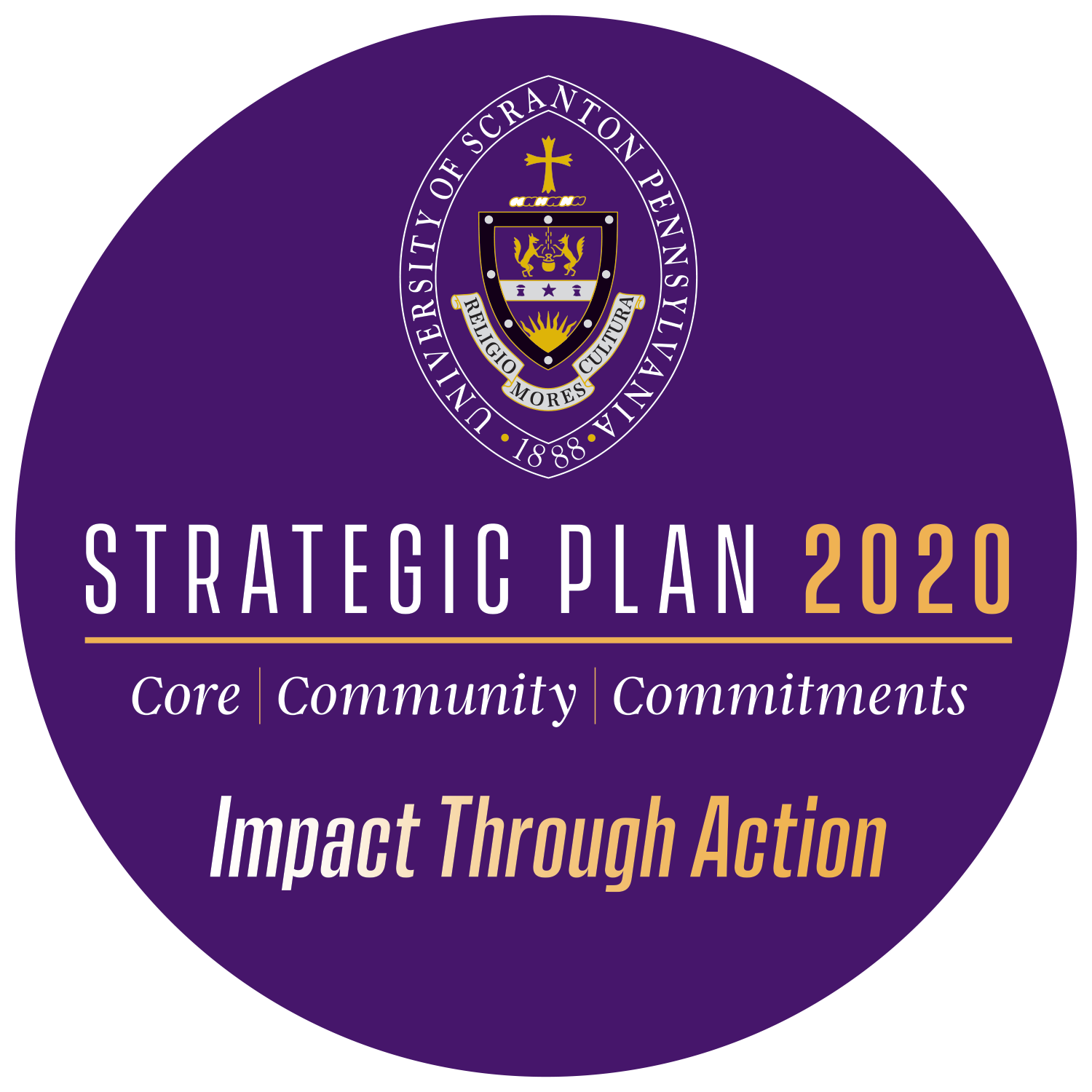Inaugural Community-Based Learning Faculty Fellows Announced
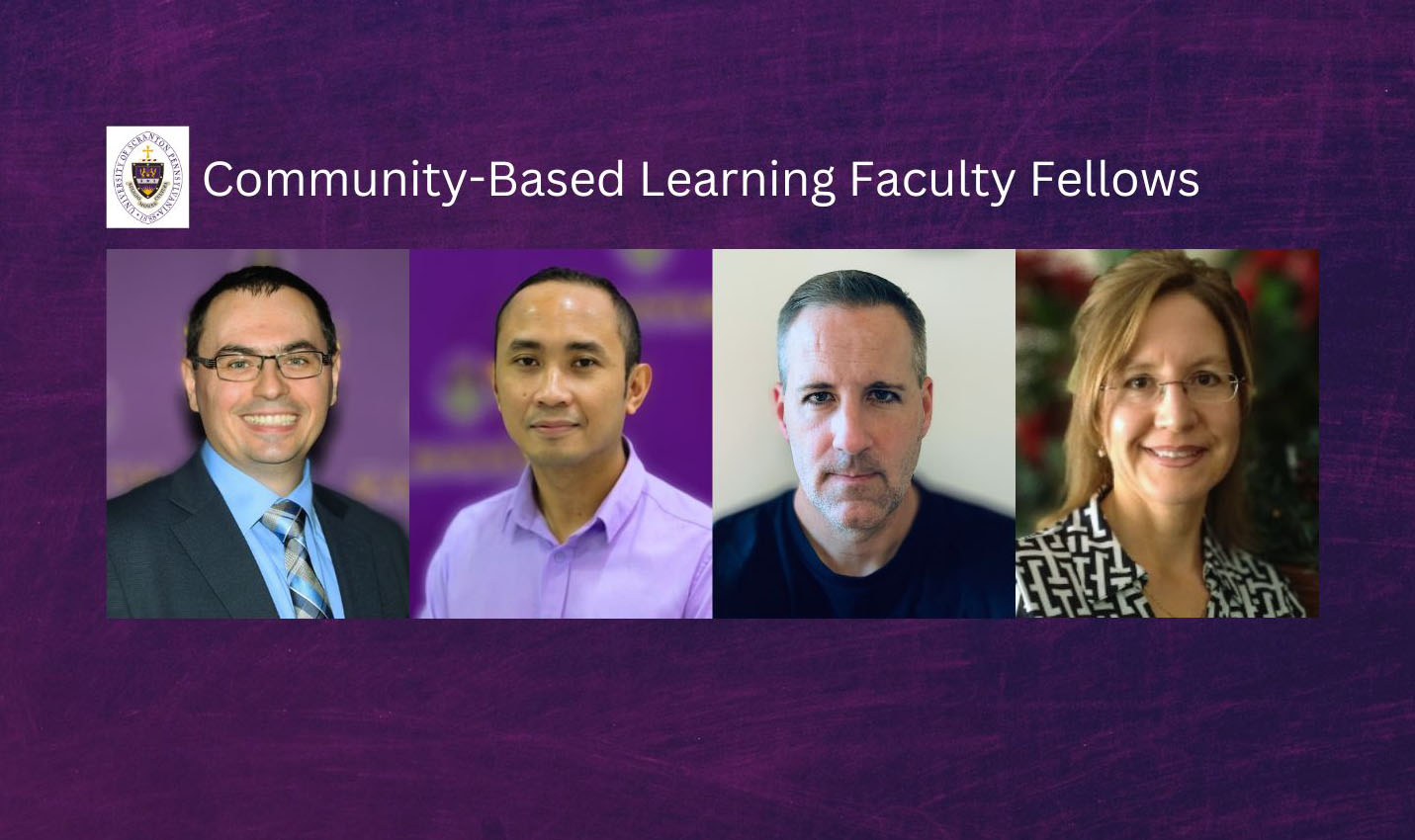
The Office of Community-Based Learning (CBL) announces the creation of the Faculty Fellows in Community-Based Learning Program at The University of Scranton. This program seeks to recognize, reward, and support exemplary faculty who are eager to fully integrate Community-Based Learning as an intentional pedagogical strategy into their courses and/or curricular-based projects. This academic experience involves students working with individuals, groups, or organizations in ways structured to meet community-defined needs. The Faculty Fellows program seeks to expand, strengthen and institutionalize Community-Based Learning at The University of Scranton as a demonstration of our commitment to the common good.
The inaugural cohort of the Community-Based Learning Faculty Fellows for Academic Year 2022-2023 are:
Ovidiu C. Cocieru, Ph.D.
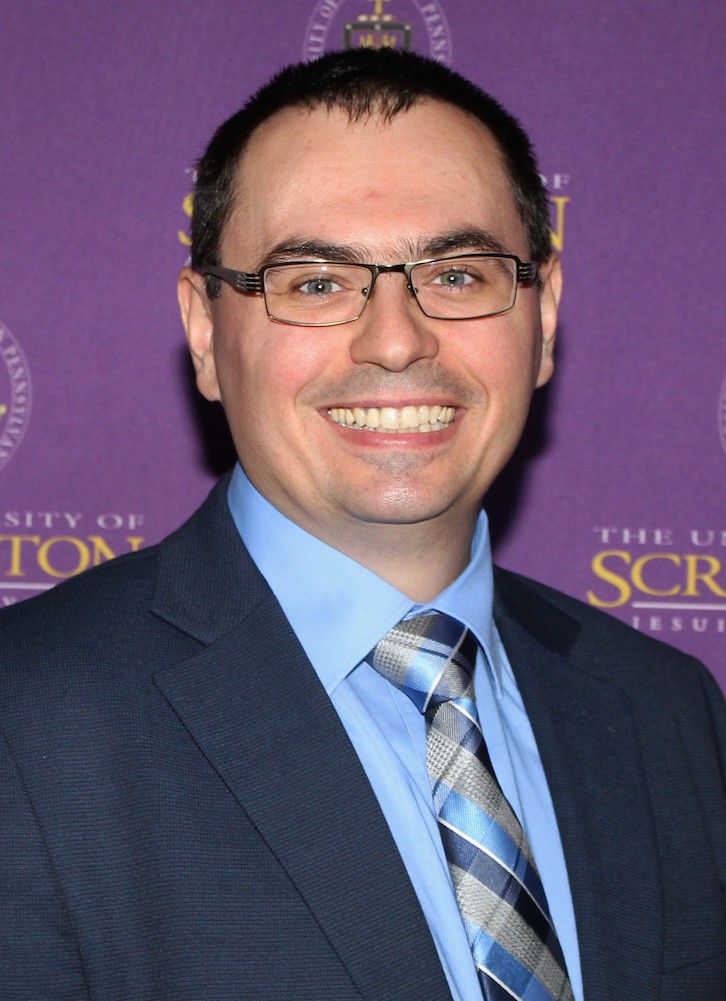 Ovidiu C. Cocieru, Ph.D., is an Assistant Professor of Management, Marketing and Entrepreneurship. His research interests are mainly focused on experiential learning. Dr. Cocieru has co-authored six peer-reviewed journal articles. He earned a doctorate in management from the University of Massachusetts at Amherst, a master’s degree in sports management from the University of Massachusetts at Amherst, and a bachelor’s degree in marketing from Alexandru Ioan Cuza University in Romania. Prior to his academic career, Dr. Cocieru worked as a manager in the event management industry. Dr. Cocieru plans to strengthen his Community-Based Learning engagement in two sections of Management 352 Principles of Management and Entrepreneurship II to support an ongoing collaboration with the Children’s Advocacy Center of NEPA during National Child Abuse Awareness Month.
Ovidiu C. Cocieru, Ph.D., is an Assistant Professor of Management, Marketing and Entrepreneurship. His research interests are mainly focused on experiential learning. Dr. Cocieru has co-authored six peer-reviewed journal articles. He earned a doctorate in management from the University of Massachusetts at Amherst, a master’s degree in sports management from the University of Massachusetts at Amherst, and a bachelor’s degree in marketing from Alexandru Ioan Cuza University in Romania. Prior to his academic career, Dr. Cocieru worked as a manager in the event management industry. Dr. Cocieru plans to strengthen his Community-Based Learning engagement in two sections of Management 352 Principles of Management and Entrepreneurship II to support an ongoing collaboration with the Children’s Advocacy Center of NEPA during National Child Abuse Awareness Month.
“The Ignatian pedagogical paradigm matches very well the theory of experiential learning that is described in the management education literature. Community-based learning is a wonderful opportunity to create empowering, meaningful, and rewarding learning experiences for our students, in which they grow as people and impact the world.”
Gerard G. Dumancas, Ph.D.
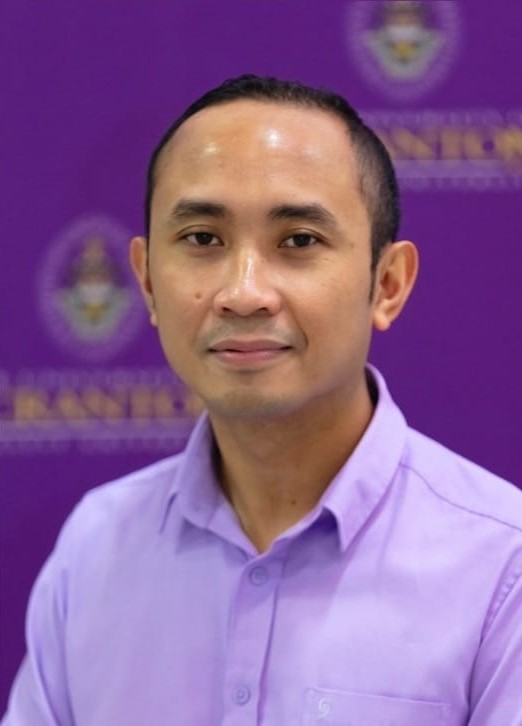 Gerard G. Dumancas, Ph.D., came to the University of Scranton as an Associate Professor of Chemistry and as the Director of the Robert Noyce Teacher Scholarship Program in Spring 2022. Since coming to the university, he has published 11 manuscripts in high-impact factor journals and has generated more than $1 million in external funding. He is presently the lead guest editor of "Sustainability," focusing on the applications of machine learning and artificial intelligence in sustainable chemistry. At the university, he teaches Instrumental Analysis lab, General and Analytical Chemistry, and Graduate level Analytical Chemistry. His research area is in chemometrics, environmental chemistry, statistical genetics, bioinformatics, and artificial intelligence as applied to analytical chemistry. Dr. Dumancas’ Community-Based Learning project’s goal is to implement a community-based learning experience in a higher-level chemistry laboratory course in collaboration with the Lackawanna River Conservation Association (LRCA) on analytical chemistry projects.
Gerard G. Dumancas, Ph.D., came to the University of Scranton as an Associate Professor of Chemistry and as the Director of the Robert Noyce Teacher Scholarship Program in Spring 2022. Since coming to the university, he has published 11 manuscripts in high-impact factor journals and has generated more than $1 million in external funding. He is presently the lead guest editor of "Sustainability," focusing on the applications of machine learning and artificial intelligence in sustainable chemistry. At the university, he teaches Instrumental Analysis lab, General and Analytical Chemistry, and Graduate level Analytical Chemistry. His research area is in chemometrics, environmental chemistry, statistical genetics, bioinformatics, and artificial intelligence as applied to analytical chemistry. Dr. Dumancas’ Community-Based Learning project’s goal is to implement a community-based learning experience in a higher-level chemistry laboratory course in collaboration with the Lackawanna River Conservation Association (LRCA) on analytical chemistry projects.
"This CBL opportunity will allow me to integrate my teaching, research, and service interests that will impact students at the University of Scranton as well as the local community. This CBL initiative will provide an opportunity for my students to develop critical thinking skills, experience the process of scientific discovery and investigation, improve communication skills and scientific literacy, and explore real-life applications of advanced analytical chemistry instrumentation to real-world scenarios."
Brian J. Snee, Ph.D.
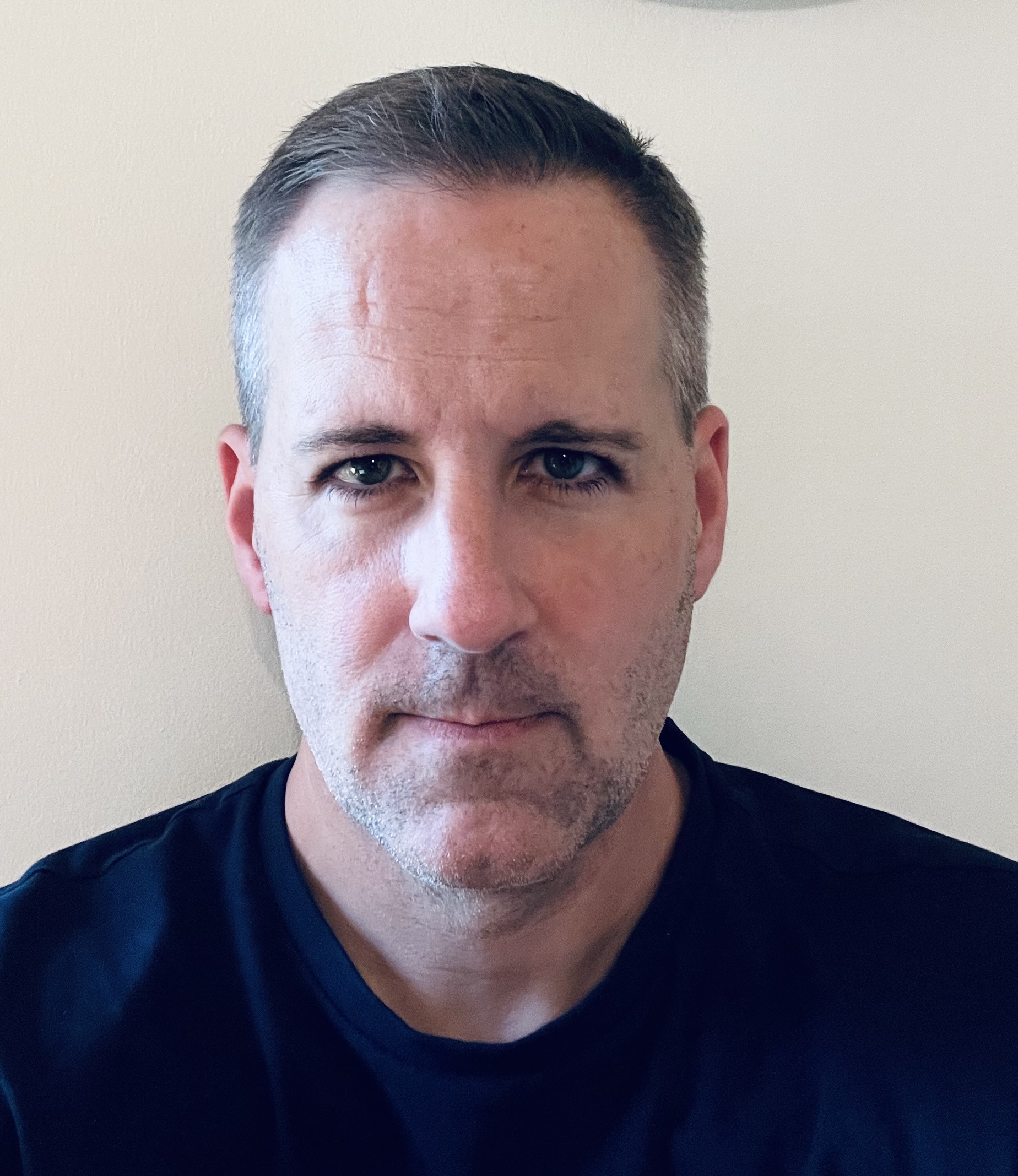 Brian J. Snee, Ph.D., is Associate Professor of Communication and Media. He earned a B.A. from The University of Scranton, and a M.A. and Ph.D. from Penn State University. He is the author of "Lincoln Before Lincoln" and the editor of "Michael Moore and the Rhetoric of Documentary". His TEDx Talk is titled, "How the Virtue of Eloquence Became a Vice." Dr. Snee will be matching his COMM 240 Communications Research Methods course with the needs of non-profit organizations.
Brian J. Snee, Ph.D., is Associate Professor of Communication and Media. He earned a B.A. from The University of Scranton, and a M.A. and Ph.D. from Penn State University. He is the author of "Lincoln Before Lincoln" and the editor of "Michael Moore and the Rhetoric of Documentary". His TEDx Talk is titled, "How the Virtue of Eloquence Became a Vice." Dr. Snee will be matching his COMM 240 Communications Research Methods course with the needs of non-profit organizations.
“Community-Based Learning brings the ‘real world’ into my classrooms by connecting my students with professional clients. Rather than completing homework assignments for a professor, my students are able to work both with and for professionals in communication and media long before graduation. It is, in my opinion, higher education at its most challenging and rewarding.”
Patricia A. Wisniewski, Ed.D., OTR/L
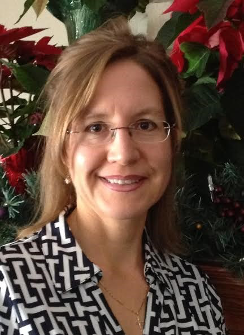 Patricia A. Wisniewski, Ed.D., OTR/L, is a faculty specialist in the Department of Occupational Therapy at The University of Scranton. Over the past 10 years, she has taught an occupational therapy course that has Community-Based Learning as a component/requirement within the course. She earned an Ed.D. in Curriculum and Instruction with a concentration in Educational Technology from the University of South Carolina and is a certified Psychiatric Rehabilitation Specialist and a CarFit trainer, event coordinator, and technician. Dr. Wisniewski partners with multiple organizations, and during her fellowship will be focusing on building upon an ongoing Community-Based Learning collaboration with the Autism Collaborative Center for Excellence for her OT 575 Community Practice in Occupational Therapy course. Graduate occupational therapy students provide community-based skill development groups for pediatric and/or adolescent/young adults who have autism or other related disabilities.
Patricia A. Wisniewski, Ed.D., OTR/L, is a faculty specialist in the Department of Occupational Therapy at The University of Scranton. Over the past 10 years, she has taught an occupational therapy course that has Community-Based Learning as a component/requirement within the course. She earned an Ed.D. in Curriculum and Instruction with a concentration in Educational Technology from the University of South Carolina and is a certified Psychiatric Rehabilitation Specialist and a CarFit trainer, event coordinator, and technician. Dr. Wisniewski partners with multiple organizations, and during her fellowship will be focusing on building upon an ongoing Community-Based Learning collaboration with the Autism Collaborative Center for Excellence for her OT 575 Community Practice in Occupational Therapy course. Graduate occupational therapy students provide community-based skill development groups for pediatric and/or adolescent/young adults who have autism or other related disabilities.
“Engaging in CBL projects transformed my occupational therapy students' worldviews about existing societal issues that prevent individuals and populations from achieving health and wellness, provided actionable insights for the community partners, and gave the students a new perspective on what navigating spaces may be like for community members with diverse needs. The occupational therapy students learned about the importance of resolving health and social disparities in the community and embraced their moral civic and professional responsibility to promote occupational justice by advocating for occupational rights that respect individuals’ and populations’ dignity, humanity, and inclusion.”
Participation in the Community-Based Learning Faculty Fellow program is open to all full-time tenured or tenure-track faculty members with up to four faculty fellows selected each academic year. The selection of faculty fellows is based on the merit of the Community-Based Learning component of the proposed course or project, the service/scholarly/teaching credentials and/or promise of the faculty member, the ability of the faculty member to contribute to strengthening the university’s Community-Based Learning initiative, the degree to which the faculty member will benefit from the fellowship, and the extent to which it benefits the external community.
Community-Based Learning Faculty Fellows commit to attending a series of monthly meetings and presenting on their course/project. The fellowship offers faculty an opportunity to modify an existing course, design a new course, or creae a curricular-based/discipline-oriented project with a Community-Based Learning component. Over the course of the year, faculty fellows have opportunities to build strong relationships with their community partner organizations, engage in scholarship on Community-Based Learning, present on their experiences, and serve as Community-Based Learning mentors to other faculty members.
Applications will be available again in winter 2023 for the 2023-2024 academic year. For more information on the Office of Community-Based Learning and the Community-Based Learning Faculty Fellows program, please visit www.scranton.edu/CBL or email Community-Based Learning Faculty Coordinator, Dr. Debra Fetherman at debra.fetherman@scranton.edu.
